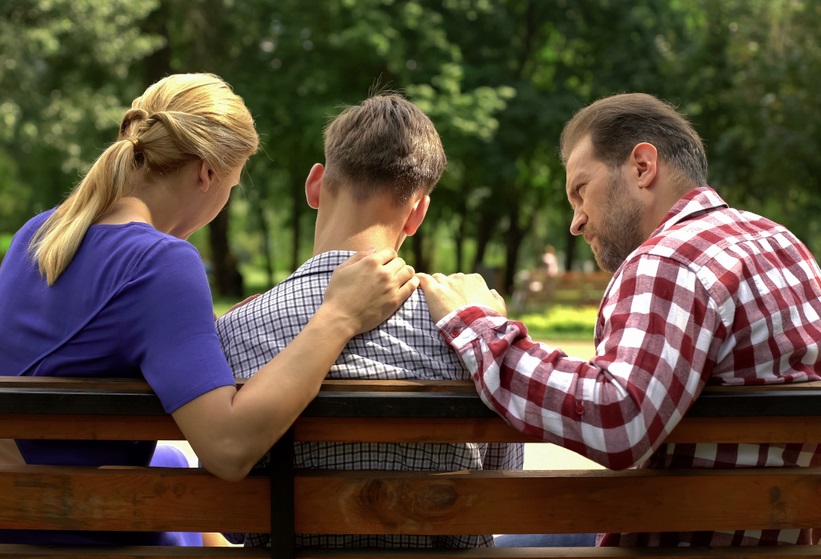Teenage love. What should parents do?

Adolescence is often the time of first romantic emotions. What is teenage love, how should parents respond to it, and how can you help a teenager who has fallen in love for the first time? Read about it in this article.
Contents:
First love in adolescents

Prostock-studio/Shutterstock.com
Psychology proves that first love is often one of the brightest memories or at least one of the most impactful ones. Without generalizing, one might even say that they have been the most innocent and sincere at this time. First love is the initiation of an accumulation of experience and new discoveries. It is full of strong feelings and it certainly has a space in people’s hearts. The way adolescents experience their first love can have a great impact on their entire future life.
Particularities and nuances of first love
The relationship between two people in adolescence is given the term “pre-intimate” by psychologists. On the one hand, they are characterized by a strong sensitivity to external and internal factors. Teenagers tend to hide such feelings from others, whilst experiencing the need to simultaneously demonstrate their feelings to the world. On the other hand, in first love, there is a lack of intimacy, the ability to sacrifice oneself for the sake of a relationship, and, at the same time, the fear of losing their loved one.
The first love of adolescents is a learning curve for feelings that prepares a person for a more mature relationship. Thanks to it, young people have the opportunity to compare their ideas of love with reality, to confront difficulties, and to find ways to solve problems.
What is the most common age for first love?

Prostock-studio/Shutterstock.com
There is no age minimum for experiencing feelings. Psychologists know children’s ability to form emotional bonds with parents, grandparents, brothers, sisters, and peers. Therefore, the child can experience their first feelings even before starting to go to school. However, a strong attraction to another boy or girl is not the same as the first big love. Conscious feelings are usually experienced between the ages of 12 and 18 years old.
How can being in love be distinguished from friendship?
The beginning of a friendship is sometimes similar to falling in love. In the beginning, there is charm and a feeling of euphoria. However, friendship differs from love as friendship does not involve passion. According to the three-component theory of love of the American psychologist Robert Sternberg, the feeling of love is a combination of intimacy, commitment, and passion. With the exclusion of the latter factor, a solid foundation of friendship is formed. Thus, friendship is a relationship that is filled with emotions, however, it is free from the passionate attraction.
Types of first love
There are several types of first love, which may result in both a happy ending and a broken heart. It is worth knowing about them, as each type can be characterized by different emotions and experiences.
1. The first feeling of love

Prostock-studio/Shutterstock.com
This is the most common type of first love. It can pass quickly, however, it may occur that the relationship of young people passes into the next phase and teenage love turns into a real, more mature feeling. Each of us knows at least a couple of people who fell in love with each other in childhood and managed to carry their feelings through the years.
2. First manifestations of platonic love
This is usually applicable to deeply hidden feelings. A person in love does not admit to another that they are in love, therefore they love secretly, and this is not always in a relationship with a sad ending. Sometimes love is enough for a teenager simply for the sake of it, as this emotional state gives them wings, even when the chosen one does not necessarily demonstrate reciprocal feelings. An example of platonic feelings could be the love for a famous person: an actor, musician, etc.
3. Non-mutual love or hard break up
This is sadly the most unpleasant type of first love: it is usually not mutual or it often ends in a sad breakup, thus harming the teenagers in love. However, the consequences of such love are usually not dangerous. They teach a lot, and after a few years, they are remembered only with warm nostalgia.
How to understand that a teenager has fallen in love?

Prostock-studio/Shutterstock.com
For example, your son played sports, but now their interest in training has faded. Or if your daughter was very happy when your whole family was going to the countryside, and now she is totally unwilling to go. Does this ring a bell to you?
- A teenager in love returns home with their head in the clouds, claiming that they are not hungry, and locks themselves in their bedroom.
- They begin to talk a lot about feelings, the future and ask you about your youth, the experience of first love, etc.
- They start spending hours in the bathroom or in front of the mirror, experimenting with their looks.
- They are constantly thinking about their chosen one and experience warm and positive thoughts towards them.
- They spend a lot of time with one person, miss them when they do not see them for a long time, and await the next meeting, whilst texting and calling their loved one.
- Your child feels insecure with this person, the palms of their hands are sweating, they find it hard to express themselves, whilst wanting to attract attention at any cost.
- The very idea that this person can meet and love someone else causes fear, anger, sadness, and other strong emotions in the teenager.
- The teenager is full of optimism, however, they may experience instant mood swings that may be hard to follow through. You never know how they will react as any comment may cause a joyful reaction or a fight.
Changes in habits, sudden changes in interests, and lifestyle are common during the time of falling in love. According to statistics, teenagers in love devote 90% of their energy to fight strong emotions and feelings. One of them is the amazing discovery that someone else may become more important to them than themselves. To understand how a teenager is feeling, you need to know what happens in their body when they plunge into their first relationship.
A strong outburst of hormones explains why teenage emotions are reminiscent of a roller coaster at this point in life.
When young people are romantically attracted, they do not yet know how to control their impulses coming from the brain. At this time, the brain produces a whole range of hormones, such as dopamine (the hormone of happiness), norepinephrine (the hormone that stimulates attention), serotonin (the hormone that controls mood), vasopressin, and oxytocin (the hormones of attachment). Under the influence of these hormones, the teenager seeks to spend their free time with their adored person. Everything else becomes meaningless to them apart from these feelings.
As exciting as first feelings are, a teen’s brain cannot sustain such fireworks for long. The average period of being in a state of romantic love most often ranges between three and six months. After this, emotions usually tend to subside. This is one of the major distinguishing factors between teenage love and more mature adult feelings, which are not as dreamy as at a young age, however, they are much more stable.
How to act around a teenager in love

Prostock-studio/Shutterstock.com
Let’s say that you already know that your child is in love, but you now do not understand what to do next? Don’t worry, first love is not the end of the world, you just need to approach this matter correctly.
What should be done? The tips of a psychologist
1. Firstly, it is important not to overestimate the child’s first love, even if you think that this feeling would soon pass.
Love replaces the whole world for a teenager, and their loved one becomes their ideal and most important person. Don’t intervene in a relationship for no reason. The situation that the child is going through is the experience that they need to acquire. Think back to your youth. Diving into your own love story will help you trust your child and respect their feelings more.
2. Secondly, you need to pay more attention to your child’s personal affair, to learn about their successes and well-being and not what they are doing or not doing.
At the end of the day, what are you afraid of? The fact that the child will do stupid things and suffer from mental pain, as you did a long time ago? In this case, it may be important to remind your teenager of the following things:
- they are valuable people, and this is what others love them for;
- love should not change their behavior solely in accordance with the needs of another person;
- love doesn’t necessarily have to involve thinking about each other every second of the day. Therefore, the child does not need to stop doing what they like, for example, practicing sports.
3. Thirdly, you will need to behave yourself in a wise way and not overburden your child with questions.

Prostock-studio/Shutterstock.com
First love doesn’t always go hand in hand with first sex, however, it may also be the case. Without getting into boring discussions about romance and sexuality, talk to your teenager to determine what is acceptable for them at their age and what is not. Share your experience unobtrusively. This will help your child to avoid problems.
4. Fourthly, do not forget about trust.
If your child told you about their romantic feelings, this is wonderful proof of your mutual trust. It is not so easy to talk about this topic. If they did this, it means that it really matters to them. Therefore, they expect to be able to count on you. Be worthy of this trust. Keep a secret, do not do what the teenager does not ask for, even if it seems reasonable from your point of view.
If, for instance, you are tempted to say, “Bring your friend to dinner and introduce them to use,” it is better for you not to do so. This may be perceived by a teenager as an invasion of their privacy, making them unwilling to share with you further on. Therefore, do not run before you can crawl. Wait for the child’s own initiative. Use their trust to talk about issues of your concern at the right time.
If a teenager did not confess to you about their feelings, and you found out about them by accident, this can be explained by their shyness or insecurity. Don’t worry if your child hides their feelings from you. You will look at it from a different angle, once you understand why they did it.
A romantic relationship for a teenager is one of the stages of manifesting autonomy. At this time, they begin to understand their strengths and weaknesses, opening themselves to new and unknown spaces, and seeking to test their limits. This desire usually throws them out of the family nest and from their usual everyday life. Even if you think your child is losing a lot by neglecting your participation in their life, approach the issue without being judgmental.
Here is a couple of extra tips:

Prostock-studio/Shutterstock.com
- Be there for your child without being always very present. Observe, sometimes ask. If they do reply, listen to them, without trying to comment and pulling the information out of them. Questions such as “who, what and why” provoke negative reactions in teenagers, even if you have a good relationship with them.
- Try not to criticize. Adolescents are so sensitive to criticism that even neutral judgments will be perceived as an issue.
- Your intervention needs to take place only as a last resort. You surely have the right to worry if the situation puts the safety of your child in danger. Try to be honest with them about your concerns prior to taking action. Approach it without emotion and with rational thinking. Otherwise, the probability that the child will listen to you will be close to zero.
What to say and how to communicate?
“My daughter of the age of 13 years old has become pretty anti-social. She is not interested in anything, her appetite is poor, her academic performance has worsened. I noticed that she often talks to a classmate, and then locks herself in her room when she comes back. I think this guy has got an influence on her behavior. When I asked what was happening, all I heard was “Nothing”, says Mary, Jade’s mother.
The response of a psychologist: Your daughter is not lying to you. She must have fallen in love for the first time and may not be fully understanding the feelings that she is experiencing. This is why it is so difficult for her to talk about it. Keep the following things in mind:
- allow your child to get used to the situation, bearing in mind that this is a natural occurrence. However, let them know that you will be happy to talk to them at any time;
- judgmental expressions such as “Where have you been?”, “Why did you come back so late?” will cause aggression in the teenager and are unlikely to lead to a constructive dialogue. Instead, talk about your own feelings: “It worries me that you are not sharing with me.” “It hurts that you are avoiding me.” Perhaps this is how you will make the child to open up;
- do not interrupt the child while they are talking. Refrain from commenting and do not act surprised with anything. By doing this, you will make it clear that you are serious about their feelings;
- switch the place of the conversation. Parents often discuss problems at home with the TV on. Take your teenager for a walk. It would probably be easier for them to discuss such matters in a different environment;
- if none of the methods helped, seek help from a psychologist. Long silence may act as a signal of depression.
After a while, Mary had a conversation with her daughter, which took place in the school park:
— Jade, you aren’t really sharing anything with me. Did something happen? I worry for you.
— Nothing major.
— I had a pretty hard time when I was your age.
— Why?
— I started growing up. I had problems with my skin, I was worried about it and would sometimes even skip class. I would consider myself the ugliest girl in class.
— Really?
— Yes. But then everything has changed.
— In what way?
— I got helped by my mother’s friend who was a nutritionist. I adopted a different diet and my skin got much better. At this point, I started feeling much more comfortable in my own skin and fell in love with my friend from my arts class.
— Was he in love with you too?
— Unfortunately not. Those feelings were not mutual. I can still remember this boy today. He used to wear trendy clothes and be the center of attention at school.
— We have got a similar boy in our class and I seem to like him…
Trust between the daughter and the mother has been established, allowing to resolve all issues.
What to do if it is taking a toll on the health and academic performance of your child?

Prostock-studio/Shutterstock.com
It is obvious that you need to be attentive to any signs of changes in the psyche of a teenager, such as the deterioration in academic performance, concentration problems and insomnia. However, if your child’s academic performance upsets you, they won’t be affected by exhortations like, “And you think your classmate isn’t doing her homework either? That would surprise me “. The child needs to be explained that they are responsible for their studies as well as for their health supported by sleep, nutrition and physical activity. The future of their well-being depends on them.
How to assist your child if the feeling of love is not mutual?
“My 16-year old son suffers from his girlfriend leaving him. He loved her for a whole year, wrote poetry and gave flowers to her, rooted for her in competitions. One day, he suddenly comes home sad and says that everything in life is meaningless. The reason is this breakup. My son is worried, but I don’t know how to help him,”- says Lucie, Peter’s mother, who is upset.
Tips of an expert:
First feelings may not only be pure joy. Unfortunately, it often ends with a broken heart. Frustrations and breakups are hard for adolescents. Therefore, they should be surrounded by loving people at such times.
- Remember that your teen has a right to their own emotions. Treat them with understanding and patience. Avoid annoying them with too much support, which can be highly exhausting.
- Don’t underestimate your child’s problems. Don’t say, “It will pass and after a while, you will fall in love again”. This advice teaches the child to treat their future adult relationships lightly and superficially.
- Do not criticize the behavior of your child that you consider to be wrong. On the contrary, if the son called their ex-girlfriend, ask them: “Did she answer? No? Maybe she is busy. Try it again in the evening after your workout”. Recommend writing a letter if the girl avoids seeing your child after a tough conversation.
- Try talking to your teenage child, although it can be emotionally painful. Do not criticize or scold the behavior of your child, even if you understand that they behaved incorrectly. Keep your opinion to yourself. A teenager will treat criticism of a loved one as an attack.
- Respect the teenager’s desire to be alone for some time, but try not to leave them alone for too long. Encourage them to hang out with friends. Create situations that make them feel like the world needs them. Invite them on an interesting trip, to the cinema or a pizzeria. Consider doing something together, for example, making, signing up to a computing class as the young boy will enjoy this, or shopping, that is most often able to uplift the girl’s mood.
First love with a sad ending is an important test and valuable lesson in which a teenager learns to become an adult. This means that they must learn to cope with the break-up and become wiser.
What should certainly not be done? Parental mistakes

Prostock-studio/Shutterstock.com
Problems in the child-parent relationship should be avoided. Here’s a quick overview of the incorrect roles adopted by parents:
The role of a policeman
It is used by parents who feel that they must control the situation. They carry out large-scale espionage activities, block entrances and exits, apply a system of punishments and intend to put things in order.
The role of the doctor
Parents tell their child that love is a rash similar to chickenpox. To recover from it, health and strength are needed. “You will see, you will get out of this situation. Everyone goes through it. You are not the first one and you are not the last one”.
The role of the producer
Parents treat teenage love like a soap opera. They “watch” it as if they were characters, rejoice at their successes, get upset about failures, cry or laugh. They treat the situation as a fictional story and wait for the moment when the child returns to reality. Which reality? Their parent’s one, of course.
The role of the victim
Parents perceive children’s love as their own misfortune, considering the fact that a child is in love as a sign of ingratitude by thinking “Our love is not enough for you, so you still have to look elsewhere.” and “It’s a shame you don’t love us anymore”.
The role of the moralist

Prostock-studio/Shutterstock.com
The notion of love may often include sexual relationships, which is taboo for parents at the age of adolescence. They sometimes apply the principle of double morality, with their sexuality being normal, and the sexuality of their children being something unacceptable. How many parents have ruined the lives of their children by using this principle?
Teenage love needs to be perceived as it is, and not as the parent wants to see it. This is the personal experience through which each teenager goes in their own way. Your child’s love is different from your love. You can be thinking that your love was more logical and correct. However, such thinking will not get you far.
Communication with a teenager in love is a delicate matter. Your child often does not see the world outside of their relationship. They rise above the ground with happiness, and after a while fall into sadness. They experience first love this way, the potency of which adults often tend to underestimate. Yes, it may be immature and short-term, however, the emotions that are associated with it, are real and important. If a young boy or girl learns how to handle them, it will be easier for them to build a solid adult relationship in the future.
Dear parents, to sum up, our task is to help children to develop sensitivity, delicacy and wisdom. By demonstrating such qualities to them, we lay a solid foundation for the future life of our children.
More materials on the parent-teenager relationships:
- This challenging age: how to help kids and their parents to go through the stage of adolescence?
- How to stop worrying about your child and become a good mother
- Teenage-parents blackmailing! How to find common grounds with the “not so little” child?
Проверьте электронный ящик



















